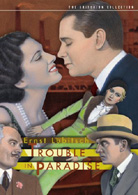Trouble in Paradise
| Ernst Lubitsch was a German émigré who began as a silent film actor and became one of the most celebrated and popular Hollywood directors of the 1930s and early ’40s. The reason for his popularity and critical acclaim was the fabled “Lubitsch Touch,” which began as a publicity term but slowly grew in legend to describe the indescribable—how Lubitsch could take material that, in any other director’s hands would be merely passable, and turn it into gold. As director Billy Wilder put it, he was “the most elegant of screen magicians.” Such is the case with Trouble in Paradise, a sophisticated and surprisingly endearing drawing room comedy (and a clear predecessor to the screwball comedy genre that really kicked off with It Happened One Night in 1934) that gleefully rolls in brazen amorality without ever once feeling in the least bit sleazy. The “Lubitsch Touch” is in great evidence in that the storyline, based on a play called The Honest Finder by Aladar Laszlo, is both lightweight and quite silly. But, as Mordaunt Hall, a film critic for The New York Times, wrote when reviewing the film in 1932, Lubitsch was “the only person in Hollywood who could have turned out such an effective entertainment from such a feathery story.” The “feathery story” involves a pair of criminals, a suave thief named Gaston Monescu (Herbert Marshall) and a vivacious con artist and pickpocket named Lily (Miriam Hopkins). In the film’s brilliantly funny opening sequence, which takes place in Venice, Gaston and Lily meet for the first time, both pretending to be upper-class aristocrats. They spend their first date swindling each other, and the scene at the dinner table in which they gleefully reveal each item they have stolen from the other (Gaston somehow managed to slip off her garter without her knowing it) plays as a hilarious form of foreplay. The sexual chemistry between them is so thick that Lily finally throws herself into Gaston’s lap, begging to know everything about him. Gaston and Lily team up as both thieves and lovers, and they set their sights on Madame Mariette Colet (Kay Francis), the extraordinarily wealthy widowed heiress of a perfume empire. The ruse is stealing Madame Colet’s diamond-studded purse at the opera one night and then returning it to her in order to collect a rich reward. Gaston takes it further, though, deciding to carry on the charade as a way of getting into Madame Colet’s sizable bank account. Posing as an urbane professional named LaValle, he gets himself hired on as her secretary, and the dialogue during the “interview” scene is so delicious that it bears printing:
The dialogue here is perfectly written, and Lubitsch directs his actors with a sublime mix of sexiness and cunning. The screenplay for Trouble in Paradise was penned by Samson Raphaelson, who worked on 11 of Lubitsch’s films, including such classics as 1940’s The Shop Around the Corner and 1943’s Heaven Can Wait. This was only their fourth collaboration, but it is obvious that their sensibilities had already clicked together. Although the storyline and plotting are nothing special, Raphaelson gives Lubitsch just the right dialogue to work with and Lubitsch handles it with … well, the “Lubitsch Touch.” As is obvious from that brief bit of dialogue, there is quite a bit sexual chemistry between Gaston and Madame Colet, as well, and the film develops into a sexual triangle, with Lily attempting to hold on to her man while Madame Colet attempts to woo him. Never forget, of course, that Gaston is there for the score, and the way in which Lubitsch massages the scenario so that everyone seems to come out a winner in the end is something of a miracle. Everything about the film is pure fantasy—from the impossibly debonair charm of Gaston, to the amusing bickering of The Major (Charlie Ruggles) and François Filiba (Edward Everett Horton), two bumbling would-be suitors who are vying for Madame Colet’s hand in marriage. Produced during some of the worst months of the Great Depression, Trouble in Paradise is glorious escapism, taking place as it does in a world of lavish, art-deco European penthouses where everyone wears crisp suits and long evening gowns. Even when an irate communist ruptures the narrative with a diatribe against Madame Colet’s careless spending habits, he is turned into a pawn for Gaston to assert himself (he tells the communist off, in Russian no less). Trouble in Paradise was released a year and a half before Hollywood put muscle behind the dictates of the Production Code—otherwise all its sexual jokes and its primary identification with attractive criminals would have not been tolerated. While certainly tame by today’s standards, the film’s constant innuendo and double entendres give it a crackling energy so that it’s hard to tell what drives the characters more: lust or greed. Of course, this makes them sound like vile people, and in truth they are. Yet, Lubitsch’s direction is so precise and the three central performances by Herbert Marshall, Miriam Hopkins, and Kay Francis are so good that these vice-ridden charlatans are redeemed, if only because they’re so witty and attractive.
Copyright © 2003 James Kendrick | |||||||||||||||||||||||||||||||||||||||||
Overall Rating: 


 (4)
(4)


